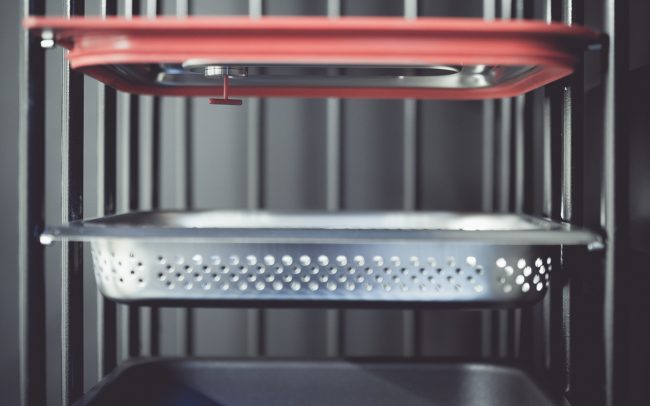CHECK CLOUD - URBANFOODLOGISTIK
urbanharbor - nomen est omen
Behind the nomenclature of the urbanharbor is the emblematic idea of an urban port. A hub for exchange - not in the original sense of goods and commodities, but ideas and innovations. A place where collaboration is put into practice, organized and supplied by digital processes and services. Companies such as Porsche Digital, Bosch Start-Up grow, Deutsche Telekom and Rieber come together here to work on tomorrow's ideas for the future. Inside the urban industrial hall, containers are anchored as a physical port component. The standardized function of the container as a logistics medium is given new spatial facets in the urbanharbor - transformed and emotionalized into working and living spaces.
For the food supply on the industrial area CHECK CLOUD organizes the logistic standard of the gastronomy, the standardized container made of stainless steel.
As early as 1964, Rieber made a significant contribution to the establishment of this logistics standard in the catering industry and continues to innovate its standardised product range to this day, for example with new lid variants for the vacuuming of food or the material of the container itself, using highly conductive multi-layer material. Rieber is therefore the perfect partner for a functionally standardised food container system.
The CHECK CLOUD is based on this food logistics standard and organises the GN containers into a closed reusable system in the canteen kitchen of the speisewerk on the urbanharbor site. CHECK HACCP is used to digitally document and organize hygiene in addition to monitoring the temperature of all food. In addition, all cold storage rooms and transporters automatically send the current room temperatures to the CHECK CLOUD, which always ensures that food and meals are stored and transported at the correct temperature. Even outside of operating hours, the operator can view the current data at any time and is immediately alerted as soon as the specified limit ranges are exceeded or undershot.
Food-safe QR code stickers at all measuring points in the kitchen and serving area clearly identify where, when and which person responsible has collected the measurement data. The speisewerk uses CHECK HACCP to digitally and transparently document the entire large canteen on-site and the catering off-site. This has reduced the time required per day for documenting the HACCP lists from approx. 45 minutes to 5-7 minutes and also ensures that all data can be called up on demand. The room in which the analogue HACCP slip folders were stored and kept, as physical evidence for the control authority, is now a meeting room in which new concepts can be discussed and developed. During routine inspections, speisewerk can now use the CHECK Cockpit to send digital HACCP lists with real-time data for specific purposes, from the cold store, to the food and bistro serving areas, to the mobile food transport equipment. A real case that shows that digitalization helps to organize and optimize existing processes.













